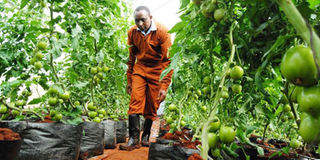Biotechnology students ask government to lift ban on GMOs

A farmer inspects his tomatoes in his greenhouse on his farm in Mathakwa-ini in Tetu, Nyeri on March 31, 2016. Pressure is piling on the government to lift a ban on genetically modified crops. PHOTO | BONIFACE MWANGI | NATION MEDIA GROUP
What you need to know:
- The students have questioned a recent move by MPs to uphold the ban imposed on GMOs by the Ministry of Health in 2012 but leave a window for its importation in case of food insecurity.
- The students argue the ban on GMOs has terminated progress in agriculture and food security research, causing many biotech research and development projects to stall.
Pressure is piling on the government to lift a ban on genetically modified crops with students from public universities accusing MPs of protecting unscrupulous traders.
The students, through their union leaders, have questioned a recent move by MPs to uphold the ban imposed by the Ministry of Health in 2012 but leave a window for its importation in case of food insecurity.
Moi University student leader Towett Ng’etich and his Kenyatta University counterpart Were Sam, claimed the lawmakers are frustrating local research to allow multinational companies benefit from importations.
“If the MPs can allow their importation to mitigate the annual food shortages, it means those talking of safety concerns are engaging in sideshows,” Mr Ng’etich said on Wednesday.
The students, mainly from the University of Nairobi, Kenyatta, Egerton, Moi and Jomo Kenyatta, urged President Kenyatta to crash the cartels, saying foreign players would dominate the Kenyan market and sell their produce at exorbitant prices.
They expressed fear that the future of students pursuing biotechnology courses was bleak and some are switching to other courses, due to fears they might not get jobs after graduation.
Kenya Biodiversity Coalition spokesperson Wanjiru Kamau has also faulted the lawmakers, saying they could have prioritised recommending importation from non-GMO growing countries, in the event of a food crisis.
The students argue the ban has terminated progress in agriculture and food security research, causing many biotech research and development projects to stall.
PROLONGED BAN
The students said it was unfair for the government to pay biotechnology lecturers and admit students to take the course, if it doesn’t recognise the technology.
“Biotechnology students directly benefit from the research, training, development, and field trials of these crops yet, with the prolonged ban, they are a demoralized lot,” Mr Sam said.
He cited the National Biosafety Authority, Kenya Plant Health Inspectorate Service as some of the regulatory agencies whose mandate is being overlooked by Health Cabinet Secretary Cleopa Mailu.
Prof Richard Mulwa, Director, Crop management Research Training Institute at Egerton University said the government has been frustrating GMO research yet Kenyans are starving.
He cited delays in approving confined field trials for GMO maize on grounds that National Environment Management Authority (Nema) was yet to endorse an Environmental Impact Assessment Report (EIA).
The Kenya Agricultural and Livestock Research Organisation and the African Agricultural Technology Foundation sought Nema’s approval in April 2015, to plant GM maize under confined field trials, to assess its suitability for planting in open farms.
Research bodies are expected by law to submit an EIA report to Nema for approval.




